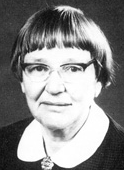Rachel Bromwich
Rachel Bromwich (30 July 1915 – 15 December 2010) born Rachel Sheldon Amos, was a British scholar. Her focus was on medieval Welsh literature, and she taught Celtic Languages and Literature in the Department of Anglo-Saxon, Norse and Celtic at Cambridge, from 1945 to 1976.[1] Among her most important contributions to the study of Welsh literature is Trioedd Ynys Prydein, her edition of the Welsh Triads.
Rachel Bromwich | |
|---|---|
 | |
| Born | Rachel Sheldon Amos 30 July 1915 Hove, Sussex, England |
| Died | 15 December 2010 Aberystwyth |
| Parent(s) | Maurice Amos |
| Relatives | Thomas John I'Anson Bromwich (father-in-law) |
| Academic work | |
| Notable works | Trioedd Ynys Prydein |
Early life and education
Bromwich was born Rachel Sheldon Amos in Hove, Sussex (some obituaries said Brighton),[2] in 1915, and spent her early childhood in Egypt.[3] Her father, Maurice Amos, was an English legal expert who served as international law adviser to the Egyptian government; her mother, Lucy Scott-Moncrieff Amos, was Scottish. The Amos family were Quakers. The family moved frequently before settling in Cumbria in 1925.[4]
In 1934 Rachel Amos attended Newnham College, Cambridge, where she studied the Anglo-Saxon language before shifting departments to focus on Middle Welsh. In 1938 she moved to the University College of Wales, Bangor and studied under Ifor Williams. Amos took a great interest in Medieval Welsh literature, and particularly the Arthurian legend; it was Williams' suggestion that she edit the Welsh Triads. She also studied Old Irish at Queen's University, Belfast, during World War II.[4]
Career
Bromwich taught Old Welsh and Old Irish at Cambridge, beginning in 1945. She was named University Reader in Celtic Languages and Literatures in 1973. She retired from teaching in 1976. In 1985, she was awarded the degree of D.Litt. by the University of Wales for her services to Welsh scholarship.[4]
In 1961 Bromwich published Trioedd Ynys Prydein, her influential edition of the Welsh Triads. A third, revised edition was published in 2006.[5] This is considered "a central work of the scholarship on medieval Welsh literature", according to her Cambridge obituary.[2] Her other major contribution to Welsh scholarship was her series of books and articles on Dafydd ap Gwilym, the outstanding Welsh poet of the period, mostly summarised in Aspects of the Poetry of Dafydd ap Gwilym (Cardiff, 1985). With D. Simon Evans she produced editions of the major medieval Welsh tale Culhwch and Olwen in both Welsh (1988) and English (1992).[6]
She served in leadership positions with the Honourable Society of the Cymmrodorion, the International Arthurian Society, and the Irish Texts Society.[3]
Selected publications
- The Continuity of the Gaelic Tradition in Eighteenth-century Ireland (1948)[7]
- Some Remarks on the Celtic Sources of "Tristan" (1955)[8]
- Matthew Arnold and Celtic literature: a retrospect, 1865-1965 (1965)[9]
- 'Trioedd Ynys Prydain' in Welsh Literature and Scholarship (1969)[10]
- Tradition and Innovation in the Poetry of Dafydd Ap Gwilym (1972)[11]
- Medieval Celtic Literature: A Select Bibliography (1974)[12]
- Dafydd ap Gwilym (1974)[13]
- Aspects of the Poetry of Dafydd Ap Gwilym: Collected Papers (1986)[14]
- Culhwch ac Olwen: testun Syr Idris Foster wedi ei olygu a'i orffen (1988)[6]
Personal life
In 1939 Rachel Amos married archaeologist and historian John Bromwich (1915-1990),[15] the son of mathematician Thomas John I'Anson Bromwich; they had one son, Brian.[3][16] Rachel Bromwich died in 2010, aged 95 years, in Aberystwyth.[4]
References
- Morgan, Gerald (2005) "A Scholar of Early Britain: Rachel Bromwich (1915– )". In Chance, Jane, Women Medievalists and the Academy pp. 769–781. University of Wisconsin Press. ISBN 0-299-20750-1.
- "Dr Rachel Bromwich (1915 – 2010)". Anglo-Saxon, Norse & Celtic, University of Cambridge. 10 January 2011. Retrieved 2020-05-28.
- Owen, Morfydd E. "BROMWICH, RACHEL SHELDON (1915-2010), scholar". Dictionary of Welsh Biography. Retrieved 2020-05-28.
- Stephens, Meic (January 14, 2011). "Rachel Bromwich: Celtic scholar celebrated for her masterly dictionary of Welsh and British legend". The Independent. Retrieved May 19, 2014.
- "Trioedd Ynys Prydein: The Triads of the Island of Britain. Third edition. Ed. and trans. Rachel Bromwich. Cardiff: University of Wales Press, 2006. cxvi + 559 pp. £65. ISBN 0–7083–1368–8". Forum for Modern Language Studies. 43 (3): 326–327. 2007-01-01. doi:10.1093/fmls/cqm045. ISSN 0015-8518.
- Bromwich, Rachel (1988). Culhwch ac Olwen: testun Syr Idris Foster wedi ei olygu a'i orffen (in Welsh). Gwasg Prifysgol Cymru.
- Bromwich, Rachel (1948). The Continuity of the Gaelic Tradition in Eighteenth-century Ireland. Society.
- Bromwich, Rachel (1955). Some Remarks on the Celtic Sources of "Tristan". Honourable Society of Cymmrodorion.
- Bromwich, Rachel (1965). Matthew Arnold and Celtic literature: a retrospect, 1865-1965. Clarendon Press.
- Bromwich, Rachel (1969). 'Trioedd Ynys Prydain' in Welsh Literature and Scholarship. University of Wales P.
- Bromwich, Rachel (1972). Tradition and Innovation in the Poetry of Dafydd Ap Gwilym. University of Wales Press. ISBN 978-0-7083-0168-5.
- Bromwich, Rachel (1974-12-15). Medieval Celtic Literature: A Select Bibliography. University of Toronto Press. ISBN 978-1-4426-5092-3.
- Bromwich, Rachel (1974). Dafydd Ap Gwilym. University of Wales Press [for] the Welsh Arts Council. ISBN 978-0-7083-0572-0.
- Bromwich, Rachel (1986). Aspects of the Poetry of Dafydd Ap Gwilym: Collected Papers. University of Wales Press. ISBN 978-0-7083-0905-6.
- "Papers of John I'Anson Bromwich". St John's College Library, via Archives Hub. Retrieved 2020-05-28.
- "Brian Bromwich 2006-07". Cambridge Centre for Sustainable Development. Retrieved 2020-05-28.
External links
- Rachel Bromwich obituary in Welsh, at BBC Newyddion.
- Edward Watson, "Rachel Bromwich" Clas Merdin (19 December 2010), a blogpost noting the death of Bromwich, with an appreciation of her work as "eloquent and authoritative".